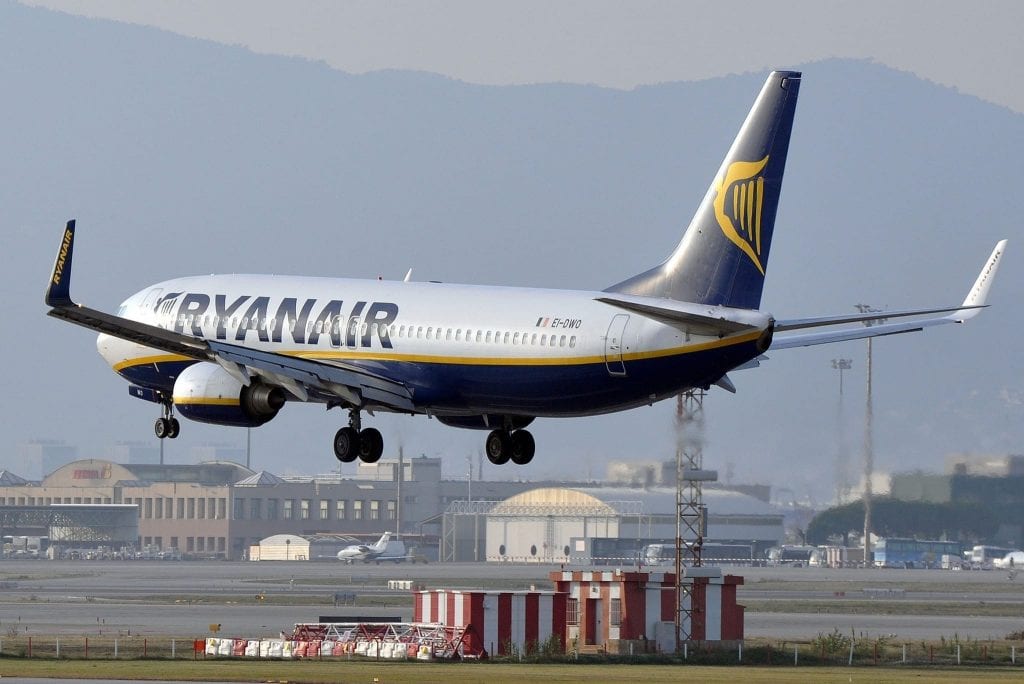Skift Take
A big jump in ancillary revenue is certainly a bright spot in a period that has been pretty challenging for Ryanair.
Ryanair said improvements in getting passengers to buy priority boarding and reserved seating drove growth in its ancillary revenue.
And if the airline is getting adept at squeezing more money out of passengers, it also intends to accelerate airline consolidation in Europe buy putting more pressure on weaker competitors this winter.
Ryanair reported a 27 percent jump in ancillary revenue as it continues to work out different ways to sell services to passengers.
Ancillary revenues hit $1.5 billion (€1.3 billion) for the six months to the end of September and made up 26.6 percent of total revenue, which increased 22.9 percent from the prior year.
With the improvements in conversion for priority boarding and reserved seating, the airline said it will continue to come up with ways to squeeze more money out of passengers through its digital development hub, Ryanair Labs.
“We will and we’ll continue to use Labs, though, to exploit and identify other means of boosting ancillary revenues,” CEO Michael O’Leary said in a conference call with analysts after the release of the results. “And I think if you look at the 27 percent jump in ancillary revenues in the first half of the year, you can see the kind of job that Labs are doing.”
The next big development in ancillary revenue is likely to come next month when Ryanair implements a new baggage policy restricting non-priority customers to one carry-on bag, although this will be bigger than what the airline currently allows.
European Consolidation
Although O’Leary expects plenty of rival airlines to struggle this winter — including Norwegian — he insists that Ryanair is unlikely yo play a part in any consolidation.
Instead the airline will look to grow its two smaller business units, Laudamotion, an Austrian low-cost carrier in which it has a 75 percent stake, and Ryanair Sun, its Polish charter carrier.
“We would expect over the next number of years that much of our growth will take place through either the Ryanair Sun vehicle in Poland and/or Laudamotion in Austria and in Germany,” O’Leary said.
“And because I think that’s a more sensible way for us to grow is to have multiple AOCs (Air Operator Certificates), a number of different brands within the business.
“But as for being a player, I mean I think our contribution to consolidation this winter is, we would expect to speed up the consolidation process by being very aggressive on pricing, driving down airfares in markets where, in particular, our competitors are not able to compete with us on price and they’re essentially unhedged on oil.”
First-Half Results
Ryanair has flagged its struggles in 2018, meaning a fall in first-half profits didn’t come as a surprise to most investors.
Profit before tax dropped 12.6 percent to $1.5 billion (€1.3 billion,) a figure that includes one-time costs associated with Laudamotion.
Total revenue increased 9.3 percent to $5.6 billion (€4.8 billion) with passenger numbers up 6 percent to 76.6 million.
Brexit Worries
Ryanair has spent the period since 2016’s Brexit vote warning of the risk to airlines and it is not giving up yet. The UK officially leaves the European Union at the end of March next year and has yet to sign a withdrawal agreement. Without a deal there could be widespread problems in the UK.
“Brexit remains a big challenge for us. It hangs over us in April of next year,” O’Leary said. “The risks of a no deal or hard Brexit have risen materially. Although on balance, we still expect that the U.K. will stumble into transition at the end of March. That transition period will last at least 21 months out to December 2020 and probably be extended thereafter.”
The Ryanair CEO is concerned about political instability in the UK.
“But the real challenge and the concern for us is that the UK government may fall,” he said. “You might stumble into a general election year, and there will be a degree of political uncertainty. What is clear is that there is hard Brexit in March of 2019 that will be or may be a disruption to flights.”
If flight disruptions take place, O’Leary doesn’t believe UK citizens would tolerate that for long.
“We suspect that disruption will be for a very limited period of time because I think it’s politically unacceptable to the UK population that they would not be able to access flights to holiday destinations in Spain, Portugal and Italy next year,” O’Leary said.
The Daily Newsletter
Our daily coverage of the global travel industry. Written by editors and analysts from across Skift’s brands.
Have a confidential tip for Skift? Get in touch
Tags: airline innovation, europe, low-cost carriers, ryanair
Photo credit: A Ryanair aircraft. The carrier is making more money selling ancillaries. Eric Salard / Flickr
